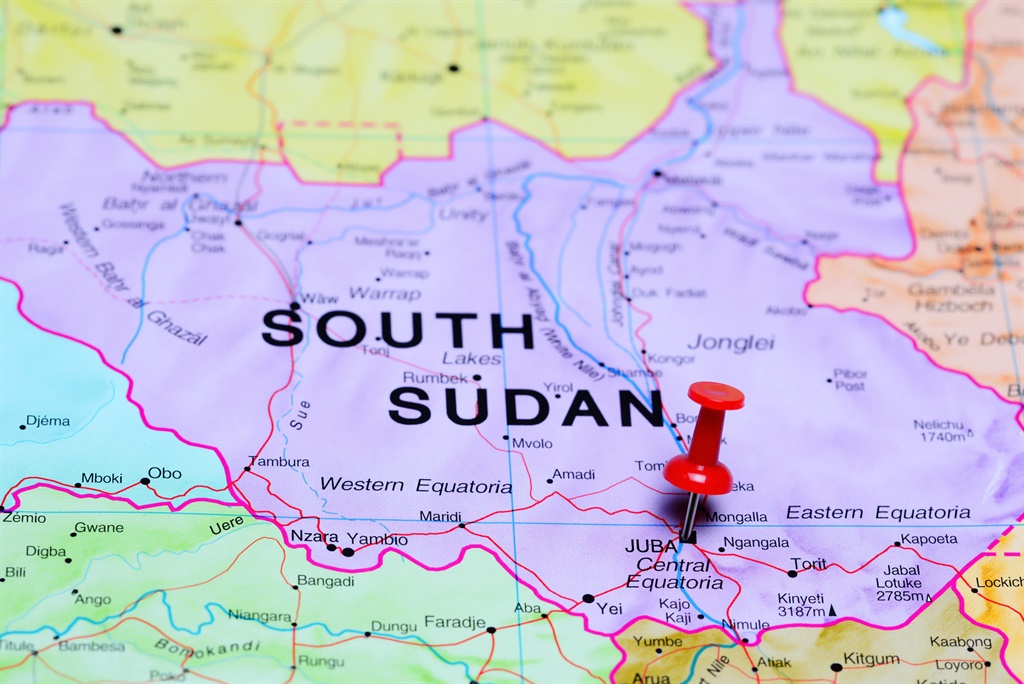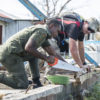Presented by Mrs M. Childs, NZ Army at the 10th International Lessons Learned Conference (10ILLC) dated Tue 17 May 17
So imagine this, the deafening sound of gunfire from assault rifles and heavy machine guns, bullets raining down, rocket propelled grenades and mortar bombs impacting within the United Nations compound and the adjacent protection of civilians safe-havens, killing, injuring and maiming hundreds, heavy artillery and tank fire interspersed with helicopter gunships overhead. Thousands of internally displaced personnel, men, women, children, and the elderly are attempting to flee this danger into the one place they perceive as a safe, the United Nations compound. But these desperate civilians are being turned away – told to stay inside the protection of civilian site – the same one that is being targeted. They rightfully ignore the warnings from the soldiers and find a way through the fence that separates the two areas.
The civilians know that the UN mandate requires the soldiers to protect them – but yet these same soldiers are seeking their own cover from the battle, many are abandoning their posts in guard towers, even leaving their rifles behind.
Now imagine that one kilometre down the road from this chaos, there are a number of civilian UN and Non-Governmental Organisation workers who are desperately (and secretly) messaging the UN Joint Operation Centre about their predicament. They are located in an accommodation compound, government troops have forcibly entered and the civilians are being subjected to and made to witness gross human rights violations, including murder, intimidation, sexual violence and acts amounting to torture perpetrated by armed Government soldiers. The UN force has armoured vehicles, heavy weapons and the mandate to fight through any opposition to extract these personnel – the force refuses.
Imagine now, that two UN blue helmet soldiers are gravely injured inside the UN compound as a result of a mortar bomb impacting on the armoured vehicle they and their colleagues are in, the medical facilities within the UN compound are not equipped to deal with the massive loss of blood. These soldiers need to get to a higher level hospital. There is one, on the other side of town at the UN Logistic base –it’s less than 20km away. The UN force has armoured vehicles, heavy weapons and the mandate to fight through any opposition to move these personnel for treatment, – they try once but face some opposition, subsequently they refuse. Both soldiers die.
This was my experience in July last year, working as a Staff Officer in Juba, the capital of South Sudan as part of UNMISS – the United Nations Mission in South Sudan. Now I am sure many of you here today have deployed with the United Nations and have some very similar stories to tell, insert a different location and it could be anyone’s story.
UNMISS failed, miserably, in its response to this crisis. But why? Did anyone see the warning signs that the force elements might react in such a way? Why didn’t’ anyone do anything about it? and what is the UN doing to stop it happening again? The answer to the first question is yes, we did see the signs within some of the force elements. In fact the Mission itself has seen similar actions, or, ‘in-action’ already in its history – so why didn’t anyone do anything about it? The answer to this – is more complex.
Today ladies and gentlemen I will share with you some of my thoughts on my own experiences working with UNMISS. I am not an academic, I was simply a staff officer who worked for seven months in the Force HQ of the UNMISS, with first-hand knowledge of the tactical, operational and strategic – political level of operations. I saw how the challenges of language, culture, a lack of will to serve, failure to share information and a lack of accountability can lead to severe shortcomings within a multi-agency organisation.
On the 09 July 2011, South Sudan became the newest country in the world. UNMISS was established with the mandate to consolidate peace and security and strengthen the capacity of this new nation. Only two years later in Dec 2013 the country was thrown into civil war as a result of the conflict between the two opposing factions, Government troops – the SPLA and opposition troops the SPLA-iO (in opposition). South Sudan’s path to peace continues to be marred by political corruption, greed, continued tribal and power based conflict, displacement, death, civil war and the recent declaration of famine. The initial challenges that faced me where those of language and culture. The military pillar of the Mission sees contributions from 61 Troop Contributing Countries (TCCs). From Australia to Zambia in both staff roles and Unit deployments. For many personnel English was their second, or even third language. Some didn’t speak it at all. This factor created a number of organisational challenges, particularly in the relaying of messages and intent – in particular Commander’s Intent.
An example of this challenge is etched into my mind – in the middle of a conventional battle the July Crisis in Juba, the situation I opened with – I was approaching a Chinese lieutenant whose soldiers were stopping the civilians from fleeing into the UN Compound – I was directing him to order his soldiers to allow the civilians in for their own safety. The attempt was fruitless until he pulled out his smart phone and gestured to me to input my orders into google translate.
Another early observation was that it was clear that the Commander’s intent was not being executed within the four sectors of South Sudan and I came to realise that although language was a barrier at times, there was more to this ‘organisational disobedience’ than just misinterpretation. I began to understand that this behaviour was also a result of both training and cultural differences. This made me reflect on my own approach – I had a different culture, and training from all of the troop contributing nations – why should I assume that my way or my expectations were the right way? What should right look like? Was I seeing an African solution to African problem? Which leads me to culture and perspective. I distinctly recall a Rwandan Colonel questioning me and some of my Australian colleagues as to why a percentage of our service people suffer PTSD as a result of the mission in South Sudan –while we discussed this, the Rwandan Colonel just looked intrigued and asked us all what was so shocking about famine and tribal killing – that this was just normal in Africa. Now, that in itself is enough to make anyone realise the differences in culture and the different lens that we all bring to a situation. It helped me understand that my perception of ‘organisational disobedience’ was slightly more complex. If this situation in South Sudan was effectively business as usual for many of the major Units – then – how can I (we as the Force HQ) encourage, motivate, order, these Units into acting and reacting in a way that saw better outcomes? Try as we might – we never did succeed in achieving this.
I turn now to the gender space – females represent 4 percent of all UNMISS personnel – this saw me as the sole senior female working within a force HQ of over 120 personnel. I have to say this wasn’t as big of an issue that many perceived it would be. Interestingly, up until only a few years ago, this particular mission was closed to females in the NZDF – myself and one of the Military Liaison Officers were the first NZDF females to serve with UNMISS. I must admit, though that constantly being called Sir did take some time to get used to. I would always correct those that used the term, they would dutifully reply yes, Sir. During one discussion with a Nepalese Captain on this matter he explained to me that it is only proper to call me sir, because it’s all about equality. And he was acknowledging my equality by calling me Sir. Suffice to say that sometimes it’s the small wins and finishing a tour with being called Ma’am and the MC opening with Lady And gentlemen was quite significant. So having had these initial impressions around language, culture and organisational disobedience I thought that perhaps the problem with this inaction of the force elements was due to a lack of consultation and buy in into the planning and tasking. I believed I was in a position to influence through my role as the Deputy Lead Planner in the Force HQ.
My role was to develop Force/Military contingency plans – Now, in order to determine the Force tasks there is a requirement to consult the Mission level contingency plan – and as we say in the Military – to ‘nest’ our work in the higher plan. Unfortunately – as I discovered – there was no Mission level plan – despite UNMISS having been established for five years not to mention the fact that it has been through a Civil War – it had still not implemented lessons identified from 2013 nor developed a co-ordinated Mission level approach to potential. As luck, or otherwise, would have it – we were nearing April and the pending return to Juba of Riek Machar – the First Vice president of South Sudan. Machar’s sacking was the catalyst to the 2013 Civil War and as such, his return was a potential, significant destabiliser to the current security situation and the impetus the Mission needed to begin planning. The semblance of a Mission co-ordinated contingency plan emerged. There was however a distinct lack of trust that the Military elements of Sector South (within which Juba resides) would have the ability to execute all allocated tasks. Close liaison was required between the Force HQ staff and the Sector HQ.
So what did we do? – The Force HQ provided mentoring and coaching to the Sector in an attempt to improve the trained state of junior commanders, and ensure the intent and tasks of the plan were understood. – This was appreciated by some – in particular the junior commanders – but not all. The Sector Commander, despite being ordered to complete the exercises – he consistently failed to allow his troops to participate. There was no accountability for these actions. Despite a mission wide attempt at co-ordination and continued refinement of Force plans, when push came to shove in July and rounds were in the air – – none of that work and planning mattered at all. There is a military saying that no plan survives H-Hr – and this was true in July last year. Not only did none of the plan get enacted, but there appeared to be no will or desire to work to the Head of Mission nor Force Commanders intent – let alone execute the primary task of UN mandate itself – Protection of Civilians. The UN Secretary General launched a special investigation into the UNMISS response to the July crisis and found that it was indeed a failure. The SG did hold people to account. The Force Commander, a three star Kenyan General, was fired as a result of the findings and the Head of Mission stepped down.
So what did I take away from these experiences?
- Understanding start state – and in particular trained state.
- Working in an environment like the UN the training standards and expectations across all nations is vastly different. Spending time with colleagues and junior leaders and understanding their perspective, providing them coaching and mentoring can make a difference.
- Knowledge and information sharing
- Something the NZDF has done well is listen to the recommendations and lessons from those that have served in South Sudan. The short loop lessons cycle has allowed changes to be made to predeployment training quickly in order to better prepare the next rotation.
- Relationships matter.
- Networking across functional boundaries is imperative in such large multi-agency environments, it really is all about who you know and can influence. New Zealanders are good at this.
- Accountability
- Without accountability for actions or inaction, large organisations will begin to display and accept learned disobedience. This cannot be the norm, especially in the military.
Lastly – the will and the drive to do the right thing is not instinctive to all. I am still not sure how to get my own head around this one – but we must be ready for people to run in the opposite direction to us.






